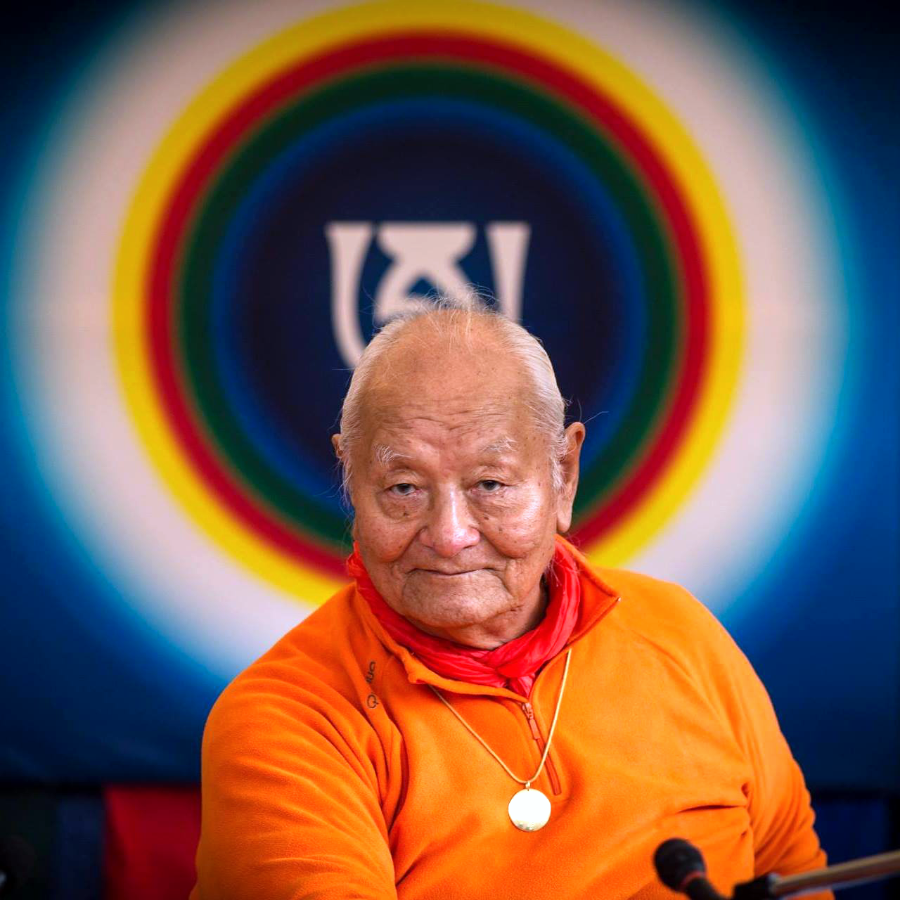
When I left Tibet and settled in the west, I realized that the Dzogchen Teaching was a vast body of knowledge that could help us to live in our condition better, beyond any cultural context, allowing for a natural spiritual and social evolution.
— Chögyal Namkhai Norbu
Chögyal Namkhai Norbu as teacher
Chögyal Namkhai Norbu was born in eastern Tibet in 1938. He was recognized at an early age as a reincarnation of the great Dzogchen master Adzom Drukpa (1842-1924). At the age of sixteen he met his root teacher Rigdzin Changchub Dorje (1863-1961), who introduced him to the authentic knowledge of Dzogchen.
Chögyal Namkhai Norbu had the opportunity to study with great masters and he had a deep respect for the Dzogchen teachings’ traditions and line of transmission. He worked tirelessly for the preservation of Tibetan language and culture, the background on which Dzogchen had flourished. On the other hand, he knew how to adapt the presentation of the teachings to different circumstances, so making them accessible to an ever-growing number of practitioners. With this intention, he developed innovative, yet rigorous and effective ways of conveying the essence of Dzogchen.
Dzogchen involves entering a state in which we experience ourselves as we really are, and so discover our real nature, our original condition. Remaining aware of this recognition, and integrating this awareness in our daily lives, we become more relaxed, and allow a happier, kinder and more meaningful mode of being to evolve spontaneously. Chögyal Namkhai Norbu saw the universal value of Dzogchen, and its benefit for all, irrespective of time, place or affiliation.
Teaching activities
In the 1970s many people from diverse backgrounds were approaching Chögyal Namkhai Norbu to ask for information and spiritual advice. These first encounters generated an increasing interest, which culminated in the first Dzogchen teaching seminar being held in Italy in the summer of 1976. And so a community of students had gradually developed, which was to become the International Dzogchen Community. In October 1981 they acquired a property in Tuscany as a location for the first center, or Gar, of the Dzogchen Community, marking the birth of Merigar. After Merigar, nine other Gars would soon be established all over the world.
In the early 1970s Rinpoche also started to teach Yantra Yoga, a practice that his uncle Togden Ugyen Tendzin had taught him. This ancient form of yoga uses harmonious movements linked to various aspects of breathing, to help practitioners gain awareness of their body, control the breath, and coordinate the vital energy.
In 1990 he introduced the Dance of the Vajra, a method of movement in contemplation. Santi Maha Sangha, which means Dzogchen Community, is a course of study and practice in nine levels that Rinpoche started in 1992.
The Longsal Cycle of teachings, or The Luminous Clarity of the Universe, Heart Essence of the Dakinins, is a collection of teachings rediscovered by Chögyal Namkhai Norbu and published in ten volumes. The picture below shows the Longsal symbol.

Guardian of Tibetan Culture
The very existence of Tibetan civilisation is under threat. Future generations of Tibetans may no longer have access to the language and culture of their forebears. Chögyal Namkhai Norbu was acutely aware of this danger, and he undertook many activities to defend and nurture his country’s cultural heritage.
In 1960, Chögyal Namkhai Norbu came to Italy at the invitation of Professor Giuseppe Tucci as a staff member of the Institute for Middle and Far Eastern Studies in Rome. He was Professor of Tibetan and Mongolian Language and Literature at the Oriental Institute of the University of Naples from 1964 to 1992, gaining recognition as a leading scholar of Tibetan civilization, particularly in the fields of history, literature, and the medical and astrological sciences.
In 2011 Rinpoche began to collect popular contemporary songs performed by young Tibetan artists, selecting them on the basis of their meaning, their melodies, and their origins. Together with his students, he recreated existing dances and in some cases developed entirely new sequences of steps and movements. This was how Khaita Joyful Dances started. Beyond the promotion of Tibetan culture, his aim was to develop music and dance as contemplative practice, and as a way to be together with awareness and respect for each other’s space. He dedicated the last years of his life to Khaita. The dances are now performed all over the world.
Organisations established under Chögyal Namkhai Norbu’s guidance
Shang Shung Publications was founded in 1983 with the principal purpose of publishing his teachings and those of other masters. Topics range from Dzogchen to Buddhism, Yantra Yoga, Tibetan culture, and traditional medicine, in the form of translations, commentaries, and practice texts, as well as study materials in audio, video, and multimedia format.
In 1988 Chögyal Namkhai Norbu creates ASIA – Association for International Solidarity in Asia – a non-governmental organisation that works in Tibet, India, Nepal, Myanmar, Mongolia, and Sri Lanka to promote projects of local collaboration and long-distance adoptions. Since its founding, ASIA has secured the right to study for more than 3,000 Tibetan children and has realized more than 200 humanitarian development and emergency aid projects.
In 1989 he establishes the Shang Shung Institute, to support scholars everywhere to pursue and develop the study of Asian art and culture. The School of Tibetan Medicine and The School of Tibetan Language are particularly active in promoting events all over the world. The Ka-ter project, created in 2002, is dedicated to the translation of works by Namkhai Norbu and ancient Dzogchen texts. Today there are branches of the Shang Shung Institute in several countries, including the UK.
The Atiyoga Foundation (ATIF) is an umbrella organisation that seeks to support the evolution of the individual by preserving the cultural heritage of Professor Namkhai Norbu. It encompasses all of the above, as well as organisations dedicated to Yantra Yoga, Khaita, Vajra Dance, and meditation.
Chögyal Namkhai Norbu’s lifestory
Chögyal Namkhai Norbu, a great Dzogchen teacher, passed away peacefully at his home in Tuscany, Italy, on September 27, 2018 at the age of 80.
More detailed accounts of the life of Chögyal Namkhai Norbu are available in our newspaper The Mirror and on the Merigar website.
Namkhai Norbu and the Dzogchen Community is a free e-booklet that can be ordered from Shang Shung Publications.
A documentary from 2011 about Chögyal Namkhai Norbu and his son Yeshi Silvano Namkhai, originally entitled My Reincarnation , is available on YouTube. There is a selection of photographs on the Images of Rinpoche page of this website.


